
Japanese
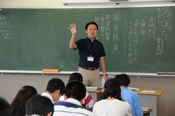
The subject of Japanese comes in three courses: contemporary literature, Japanese classics, and kambun (Chinese classics). Students are required to learn each field and acquire the following skills.
<Contemporary literature>
Read and accurately comprehend critical essays that are highly abstract and logically complex, and express their opinions. Understand and appreciate novels and stories that describe subtle feelings of the characters.
<Japanese classics>
Read advanced-level classics such as The Tale of Genji by using a dictionary, and develop an interest in Japanese classics. Learn about people’s lifestyles and cultures of the period through the text.
<Kambun>
Read poetry and prose, histories and biographies, and works of great thinkers. Comprehend them correctly and deeply through the Japanese method of reading Chinese texts. Learn the background of the literary works of China and become aware of their influence on Japanese culture.
Social studies (history, geography, political science, economics, ethics)
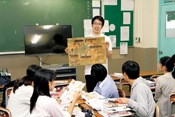
We offer Geography A and World History A in the first year, Japanese History and Ethics in the second year, and Political Science and Economics in the third year as required courses, so that students, both from arts and sciences, can acquire skills to comprehend social matters historically and scientifically. Third-year students choose from elective courses of geography, Japanese history, world history, and comprehensive social studies according to their interests and future ambitions. Teachers offer their classes enthusiastically using their original teaching materials. Students are required to not only listen to lectures but also make presentations and reports. They read many books, undergo research, and acquire thinking and writing skills. First and second year students in geography and history classes display their products of summer assignments (maps and reports) at the Toin-sai school festival.
Mathematics
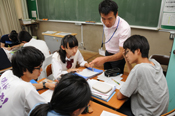
Math classes taught at high schools are generally thought to consist of memorizing formulas and solution patterns and practicing for entrance exams. Students may acquire skills to solve exam questions through these classes but cannot develop skills of logical thinking and expressing opinions. Teachers at our math classes not only give one-way lectures but also encourage students to think deeply and express their opinions. We enjoy thinking, discussing and learning with our students in hopes that they will not just look at short-term goals but acquire skills that are applicable in the society.
Science
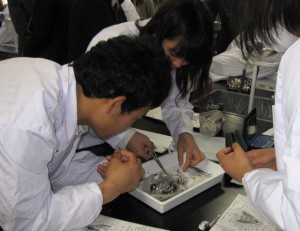
Our science class conducts many experiments and observations to let students learn from firsthand experiences and acquire scientific knowledge and logical thinking skills. Four laboratories and three tiered-seating lecture rooms with demonstration experimentation tables are available for this purpose. Experiments and observations deal with various topics, including inherited topics that are highly effective in education and newly developed topics.
Students take at least three subjects from among physics, chemistry, biology, and earth science and acquire a well-balanced scientific understanding that are applicable when selecting future paths. Our science teachers prepare original materials including those of advanced level based on students’ abilities and interests, to help them understand better.
Foreign languages
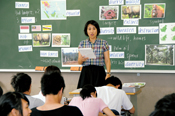
We consider English as a living language. It should not be considered as just another course, but as the very means of communication. Our English class equally focuses on four skills: listening, speaking, reading, and writing. Students acquire basic skills in the first half of their high school days. A native speaker teaches first year students once a week. In the upper grades, students acquire applicable and higher level of English proficiency. In 2008, we received the “School Prize” in the Zeneiren all Japan English composition contest, in which third year students participate every year. Second and third year students can learn German, French and Chinese if they wish.
Health and physical education
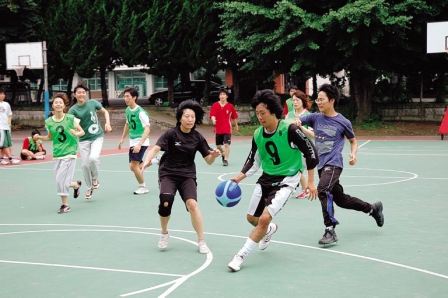
Our school grounds are large enough to hold a regulation size soccer field, a gymnasium where three volleyball games can be played simultaneously, a multipurpose court, a martial arts facility, and a swimming pool. Two credits are taken in the first year, and three credits in the second and third years. In health education classes, we study health-related topics and issues, as well as learn about the cultural sides of sports.
Home economics
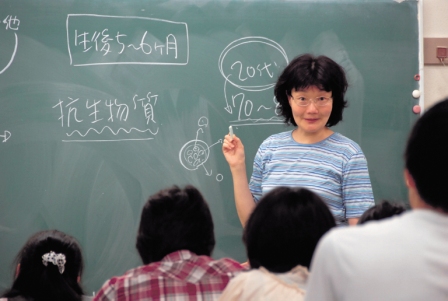
We teach basic home economics as a 2-credit required subject in the second year and food design as a 2-credit optional subject in the third year. In the basic home economics class, we teach things that will be useful for students’ lives in the future.
In the food design class, we allot many hours to cooking practice to let students learn eating habits through firsthand experience.
Art, industrial arts, music, calligraphy
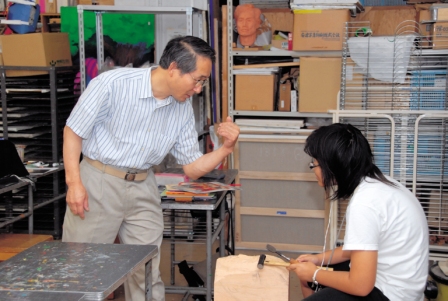
We offer four subjects in the art course to accommodate students’ broad range of interests: art, industrial arts, music, and calligraphy. Not many high schools offer as many as four art-related subjects. Students choose a subject when they enter the school, which they will learn for the next two years. We teach various styles and effects of artistic expression, and cultivate aesthetic senses through creative activities. Second year students display their works or musical performance at the Toin-sai school festival.
Information
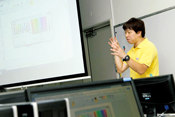
We offer a two-credit information course in the first year, so that students can apply acquired knowledge not only to the learning of other subjects but also to the general aspects of their school lives.
The Information course has two main objectives. One is to acquire “information literacy” to manage the three-stage information cycle: efficient “gathering,” interpreting and “organizing,” and clear “conveying” of correct information. The other is to acquire “information creativity” to create new valuable information from existing information. Necessary skills and attitude are acquired through a variety of activities such as group work, individual research and presentations.








